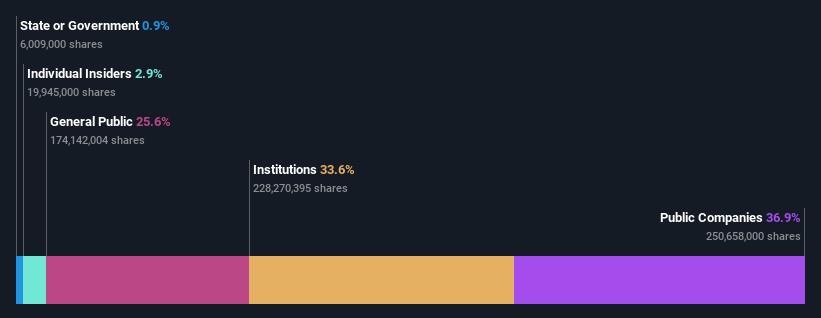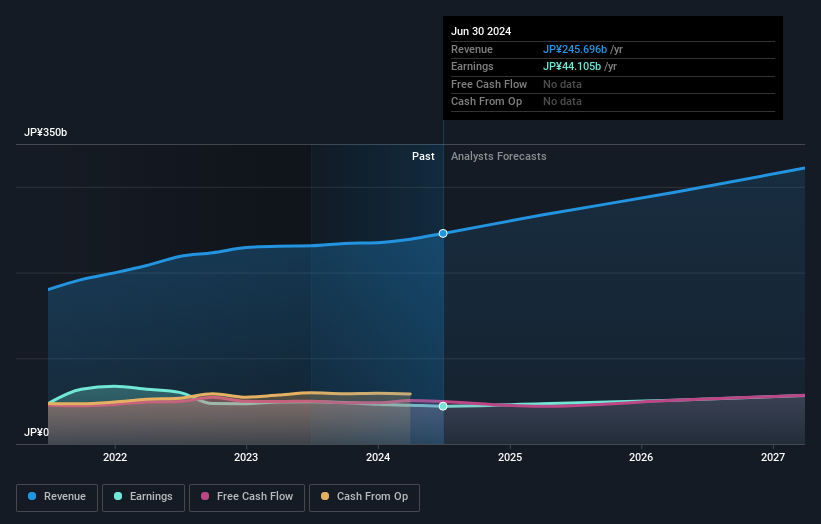- Japan
- /
- Healthtech
- /
- TSE:2413
While institutions own 34% of M3, Inc. (TSE:2413), public companies are its largest shareholders with 37% ownership

Key Insights
- M3's significant public companies ownership suggests that the key decisions are influenced by shareholders from the larger public
- The top 6 shareholders own 52% of the company
- Institutional ownership in M3 is 34%
If you want to know who really controls M3, Inc. (TSE:2413), then you'll have to look at the makeup of its share registry. And the group that holds the biggest piece of the pie are public companies with 37% ownership. That is, the group stands to benefit the most if the stock rises (or lose the most if there is a downturn).
Meanwhile, institutions make up 34% of the company’s shareholders. Institutions will often hold stock in bigger companies, and we expect to see insiders owning a noticeable percentage of the smaller ones.
Let's take a closer look to see what the different types of shareholders can tell us about M3.
Check out our latest analysis for M3

What Does The Institutional Ownership Tell Us About M3?
Many institutions measure their performance against an index that approximates the local market. So they usually pay more attention to companies that are included in major indices.
M3 already has institutions on the share registry. Indeed, they own a respectable stake in the company. This implies the analysts working for those institutions have looked at the stock and they like it. But just like anyone else, they could be wrong. It is not uncommon to see a big share price drop if two large institutional investors try to sell out of a stock at the same time. So it is worth checking the past earnings trajectory of M3, (below). Of course, keep in mind that there are other factors to consider, too.

Hedge funds don't have many shares in M3. Looking at our data, we can see that the largest shareholder is Sony Group Corporation with 34% of shares outstanding. Nomura Asset Management Co., Ltd. is the second largest shareholder owning 5.9% of common stock, and Baillie Gifford & Co. holds about 4.1% of the company stock. In addition, we found that Itaru Tanimura, the CEO has 2.9% of the shares allocated to their name.
We also observed that the top 6 shareholders account for more than half of the share register, with a few smaller shareholders to balance the interests of the larger ones to a certain extent.
While studying institutional ownership for a company can add value to your research, it is also a good practice to research analyst recommendations to get a deeper understand of a stock's expected performance. There are a reasonable number of analysts covering the stock, so it might be useful to find out their aggregate view on the future.
Insider Ownership Of M3
While the precise definition of an insider can be subjective, almost everyone considers board members to be insiders. Management ultimately answers to the board. However, it is not uncommon for managers to be executive board members, especially if they are a founder or the CEO.
I generally consider insider ownership to be a good thing. However, on some occasions it makes it more difficult for other shareholders to hold the board accountable for decisions.
We can report that insiders do own shares in M3, Inc.. The insiders have a meaningful stake worth JP¥28b. Most would see this as a real positive. Most would say this shows alignment of interests between shareholders and the board. Still, it might be worth checking if those insiders have been selling.
General Public Ownership
The general public-- including retail investors -- own 26% stake in the company, and hence can't easily be ignored. While this size of ownership may not be enough to sway a policy decision in their favour, they can still make a collective impact on company policies.
Public Company Ownership
Public companies currently own 37% of M3 stock. This may be a strategic interest and the two companies may have related business interests. It could be that they have de-merged. This holding is probably worth investigating further.
Next Steps:
I find it very interesting to look at who exactly owns a company. But to truly gain insight, we need to consider other information, too.
Many find it useful to take an in depth look at how a company has performed in the past. You can access this detailed graph of past earnings, revenue and cash flow.
Ultimately the future is most important. You can access this free report on analyst forecasts for the company.
NB: Figures in this article are calculated using data from the last twelve months, which refer to the 12-month period ending on the last date of the month the financial statement is dated. This may not be consistent with full year annual report figures.
New: Manage All Your Stock Portfolios in One Place
We've created the ultimate portfolio companion for stock investors, and it's free.
• Connect an unlimited number of Portfolios and see your total in one currency
• Be alerted to new Warning Signs or Risks via email or mobile
• Track the Fair Value of your stocks
Have feedback on this article? Concerned about the content? Get in touch with us directly. Alternatively, email editorial-team (at) simplywallst.com.
This article by Simply Wall St is general in nature. We provide commentary based on historical data and analyst forecasts only using an unbiased methodology and our articles are not intended to be financial advice. It does not constitute a recommendation to buy or sell any stock, and does not take account of your objectives, or your financial situation. We aim to bring you long-term focused analysis driven by fundamental data. Note that our analysis may not factor in the latest price-sensitive company announcements or qualitative material. Simply Wall St has no position in any stocks mentioned.
About TSE:2413
M3
Provides medical-related services primarily to physicians and other healthcare professionals through Internet.
Undervalued with excellent balance sheet and pays a dividend.


